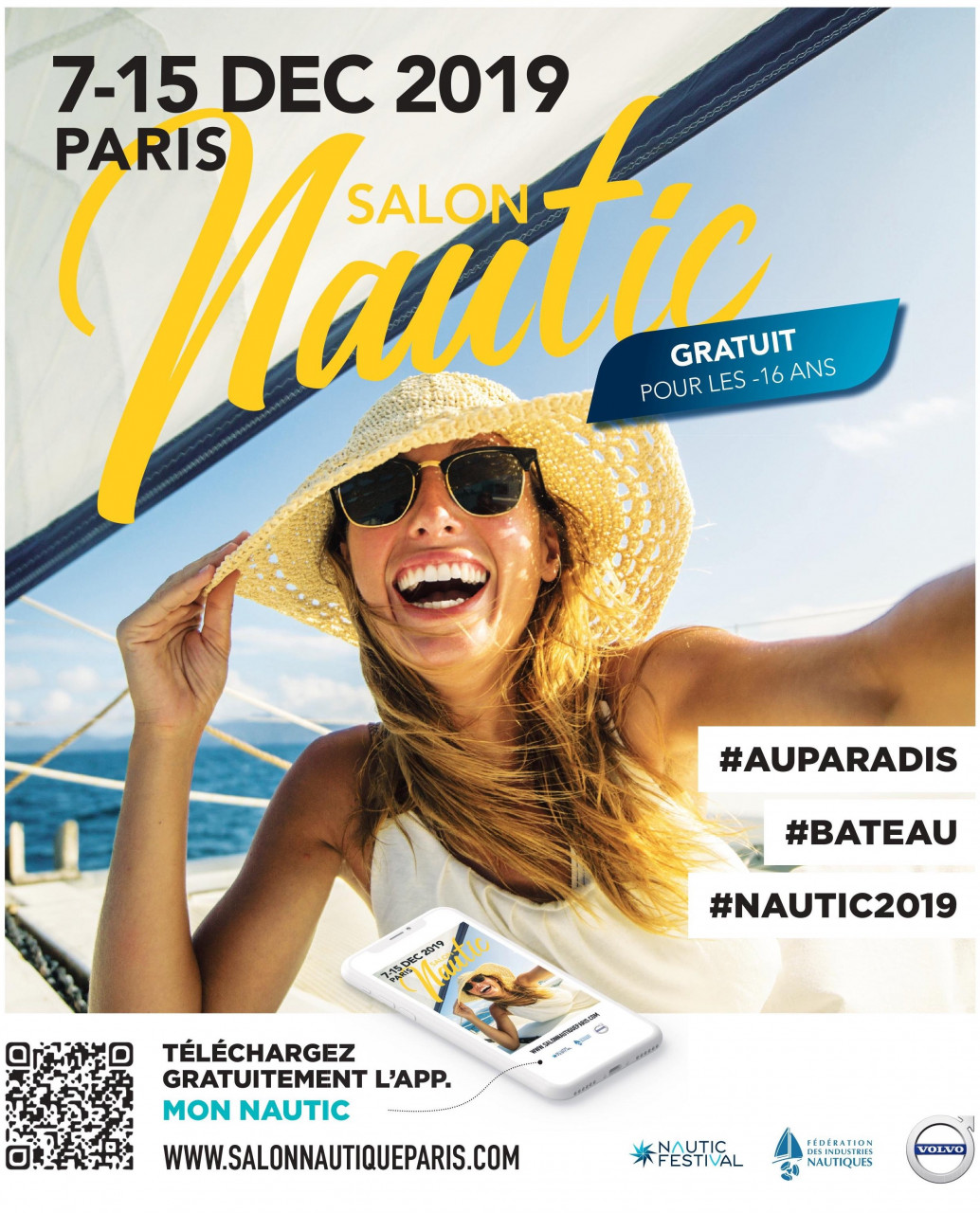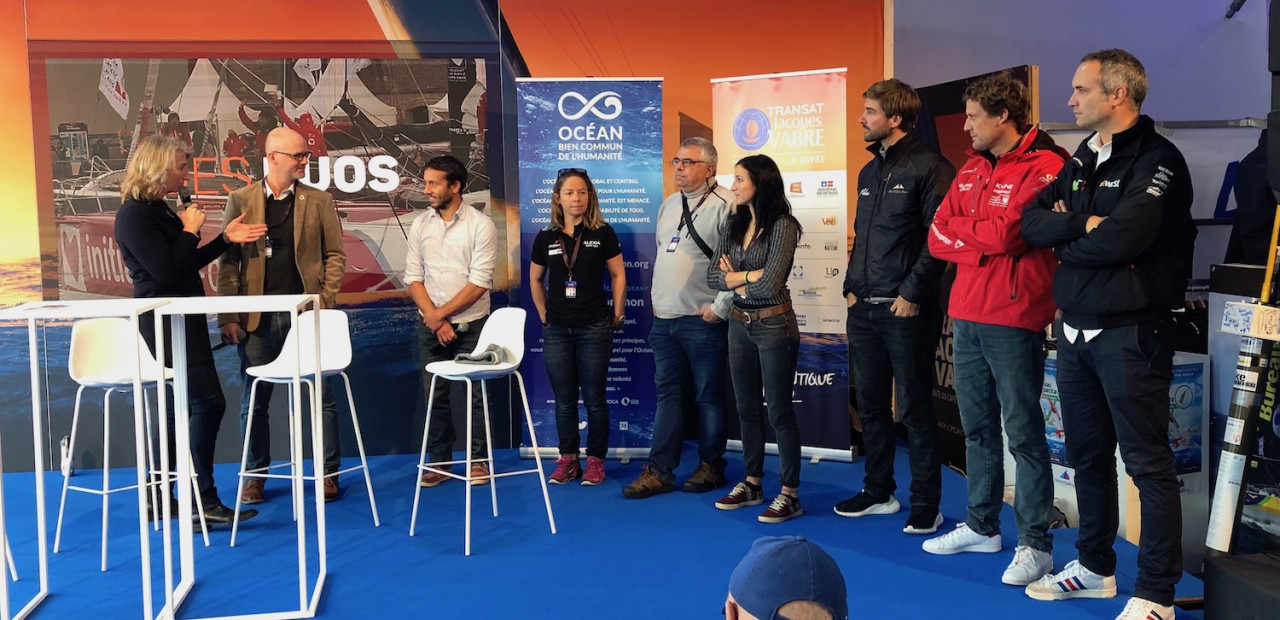In Paris, the IMOCA class continues to campaign for the Ocean

At the Nautic boat show in Paris (from 7th to 15th December), the IMOCA class will continue to assert its involvement in sustainable development. It will be present on a stand located in the Blue Zone (Hall 1) where several skippers will present their campaigns for the ocean.
This presence at the Nautic follows on from the measures taken during the Transat Jacques Vabre in which various boats collected data for scientific research in partnership with the IOC/UNESCO (Intergovernmental oceanographic commission).
The IMOCA class invited to the Blue Zone at the Nautic
This year, the Paris boat show has launched an area dedicated to the ecological transition and solidarity (Hall 1) porte de Versailles in Paris. Throughout the show, various sailors will attend to present concrete measures in favour of the ocean and sustainable development. Phil Sharp, Alexia Barrier, Louis Burton, Fabrice Amedeo, Paul Meilhat, Benjamin Dutreux and Stéphane Le Diraison have already confirmed they will be attending. On Wednesday 11th December, a conference will be held at the stand during which the IMOCA class will present its commitment to the ocean. Following on from that, a partnership will be signed between the IMOCA class and UNESCO’s Intergovernmental oceanographic commission.
“It’s great that the Nautic has taken into account this aspect of sustainable development,” declared Paul Meilhat, one of the most committed skippers. “There is plenty of room for progress, but this is a good start, which the world of ocean racing has been looking forward to. As a class, this means working with race organisers, but also events like the Nautic, which brings together all those involved once a year. Everyone is aware that there are a lot of changes to make to reduce our impact and we need to get started immediately to avoid being too late. It’s nice that the IMOCA class is part of the change.”

A look back at the concrete measures taken during the Transat Jacques Vabre
The Transat Jacques Vabre worked in conjunction with the #NoPlasticChallenge campaign under the patronage of Stéphane Le Diraison (Time For Oceans), in order to encourage the general public to reduce its consumption of plastic. Each day, Stéphane’s team presented a concrete measure on social networks that we can apply in our workplace, office, out on the water or in our personal life.
On 23rd October, some IMOCA skippers were involved in cleaning up the beach in Le Havre, around an initiative from the Surfrider Foundation Europe and the sailor, Paul Meilhat (Initiatives-Cœur). “We managed to get lots of skippers involved,”said Paul. “Today, there is a clear trend that is visible in the IMOCA class with its commitment to sustainable development. Cleaning up the beach was one of the main features of our campaign to make people more aware of the problem. The IMOCA class is trying to change things at its level.”
The Transat Jacques Vabre also joined up with the Ocean As Common appeal, which is campaigning to get the sea and coastal waters to be seen as a common good for mankind. The organisers also signed the charter with 15 eco-friendly commitments for organisers of sporting events, which was launched in 2017 by the Ministry of Sport, in partnership with the NGO, WWF France. The IMOCA class is particularly pleased to see such measures being taken.
Collecting scientific data
During the Transat Jacques Vabre, four double-handed crews contributed to the collection of scientific data. Alexia Barrier and Joan Mulloy (4myplanet) took an Argo beacon aboard. “I am collecting data at sea to preserve my playground,” explained Alexia. “We had two scientific missions for the Transat Jacques Vabre. The first was to use an Argo profiler (photo). This is a rod, which picks up data on the oceans from a depth of 1000 metres for the satellites that observe the oceans. We also had a thermo-salinometer, which takes measures every four seconds on the surface of the water for scientists in European research programmes, in particular at the GOOS and Ifremer. This data is important to add to current studies observing the climate on routes rarely taken by research vessels.”
Boris Herrmann and Will Harris (Malizia 2 Yacht Club de Monaco) took aboard a weather drifter float, as did Stéphane Le Diraison and François Guiffant (Time For Oceans). This buoy enables measurements to be taken of the surface temperature and the atmospheric pressure, as well as surface currents. The buoy regularly sends back extremely precise scientific data to the Global Telecommunications System, the World Meteorological Organisation’s international data network. This platform enables forecasters and scientists from around the world to access information free of charge.
Fabrice Amedeo and Eric Péron (Newrest-Art & Fenêtres) took aboard an oceanographic sensor capable of measuring levels of CO2 and salinity as well as the surface temperature. This means it is possible to measure the impact of global warming on the oceans. The data will be made available to the scientific community as open data. “I wanted to give a purpose to my sailing and take things seriously by serving science,” explained Fabrice Amedeo.
All of the various data that was collected will be made available to the GOOS ocean community, whose project was presented in Le Havre at a conference held by Catherine Chabaud in the framework of the partnership between UNESCO’s Intergovernmental oceanographic commission (UNESCO/IOC) and the IMOCA class.
Teams info
Lunven and Soudée on the dockside in Lorient: preparing for a classic north Atlantic passage
Once again La Base marina in Lorient, Brittany – the main home of the IMOCA fleet – is a hive of activity as 33 boats and their skippers prepare for the daunting challenge of the North Atlantic alone.
•••The Ocean Race will return to Genova for European event in 2025
Following the success of ‘The Grand Finale’ in 2023, Genova will be a key stopover for The Ocean Race Europe in 2025.
•••